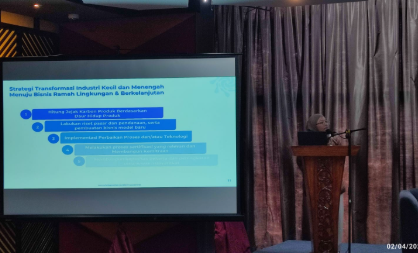Surabaya, February 4, 2025—The industrial sector in East Java continues to grow and contribute significantly to the national economy. The contribution of East Java’s Gross Regional Domestic Product (GRDP) to the National Gross Domestic Product (GDP) reached 14.37 percent, with the manufacturing sector growing by 5.49 percent in the third quarter of 2024, surpassing the national growth recorded at 5.23 percent. However, in the midst of this growth, a major challenge arises in maintaining a balance between industrial progress and environmental sustainability.
Arif Khamzah, Head of the Industrial Empowerment Division, East Java Provincial Industry and Trade Office, stated that although the Small and Medium Industry (SMI) has a significant role in the regional economy, the challenges are complex. Technological limitations, financing difficulties, low quality of human resources, lack of product standardization, and limited market access are still the main obstacles that hamper small industries’ competitiveness.
“To overcome these challenges, the government is implementing several key strategies, such as industrial and trade development, improved standardization, adoption of new technologies, strengthening exports and promotion, consumer protection, and market stabilization. These steps are expected to increase the competitiveness of SMEs to be more competitive in the national and global markets,” Arif said in the Forum on Increasing the Competitiveness of Small and Medium Industry (SMI) Products and Micro, Small and Medium Enterprises (MSMEs) organized by the Institute for Essential Services Reform (IESR) on Tuesday (4/2/2025).
Budi Setiawan, Director of Small and Medium Industries of Chemical, Clothing, and Handicrafts at the Ministry of Industry, emphasized that one of the main strategies for improving the competitiveness of SMEs is through partnership programs with large industries, SOEs, local governments, and other economic sectors. These programs aim to open market access, improve production quality, and strengthen the domestic industrial supply chain.
“In this scheme, IKMs will be assisted in product development, quality certification, and improving production skills to meet higher industry standards. This partnership is also expanded with the establishment of IKM centers in industrial estates, where business actors can support each other by providing raw materials, utilizing production waste, and providing industrial support goods. This step is believed to create a more efficient and sustainable business ecosystem,” Budi said.
Bambang Riznanto, Head of the Center for Formulation, Implementation, and Enforcement of Industrial Standardization, Ministry of Industry, added that industrial standardization is essential in improving the competitiveness of IKM and MSME products. By applying the Indonesian National Standard (SNI) or other international standards, products produced by SMEs will be of higher quality, safer, and more likely to penetrate the global market.
“This quality certification includes auditing the production process, testing product quality, and implementing a quality management system. In addition, cooperation between industry players through maklon and brands can also strengthen the industrial ecosystem. Maklun allows businesses to produce goods using other parties’ brands, while brand cooperation connects producers with brand holders to expand market reach,” Bambang said.
Meanwhile, in facing environmental challenges, Faricha Hidayati, Industrial Decarbonization Coordinator from the Institute for Essential Services Reform (IESR), emphasized that decarbonization is a strategic step in encouraging sustainable industrial growth. SMEs have a major contribution to the economy but also have significant environmental impacts, especially in terms of energy use and waste management.
For this reason, cross-sector collaboration is needed to support SMEs in implementing environmentally friendly business practices. Faricha emphasized that the use of renewable energy, energy efficiency, supply chain optimization, regulatory support, and green funding are the main keys to the transition to a low-carbon industry.

